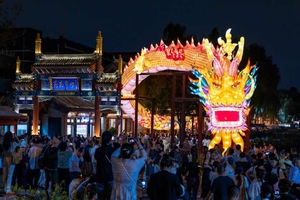Hong Hao: How Singapore and Dubai Became Global Hubs for Transportation and Finance
Listen to the full version


In August, our educational tour took us to two cities, Singapore and Dubai, both crucial global hubs for transportation, shipping, and finance, and key overseas destinations for Chinese capital.
In Singapore, we visited a range of globally renowned quant and private equity funds, as well as the nation’s sovereign wealth fund. We explored the differences in risk preferences and management philosophies rooted in cultural traditions between Chinese and foreign markets, discussing the resulting investment opportunities and risks.

Download our app to receive breaking news alerts and read the news on the go.
Get our weekly free Must-Read newsletter.
- DIGEST HUB
- The educational tour visited Singapore and Dubai, focusing on financial hubs and investment opportunities.
- Singapore’s asset prices are rising due to global capital flows, while Dubai sees cautious investment yet significant economic development.
- Both cities exemplify success through financial deregulation, capital flow, and infrastructure development, despite past economic challenges.
In August, our educational tour took us to Singapore and Dubai, both significant global hubs for transportation, shipping, and finance, key destinations for Chinese capital [para. 1]. In Singapore, we visited globally renowned quant and private equity funds, including the nation's sovereign wealth fund. We discussed the differences in risk preferences and management philosophies between the Chinese and foreign markets, uncovering various investment opportunities and risks [para. 2]. The flow of global capital dictates asset price trends and influences risk preferences and capital movement. With capital chasing lucrative opportunities, Singapore has emerged as a magnet for millionaires worldwide [para. 3]. As a result, the city-state has seen skyrocketing asset prices and property values, even affecting local commodities like durians and cocktails, which have become unexpectedly costly [para. 4]. This phenomenon, often referred to as inflation, points to a high demand amid scarce supply. Moderate and orderly inflation is generally considered preferable to deflation, which poses a greater challenge for central banks [para. 5].
During our visit, Singapore unveiled a series of fiscal stimulus policies targeting birth rates, housing, education, and elder care, all aimed at bolstering economic growth. With urban infrastructure investments nearly complete, the nation now focuses on financial liberalization to attract more capital and talent, transitioning from rapid growth to more nuanced progress [para. 6]. From Singapore, we flew to Dubai and visited globally acclaimed sovereign wealth funds. Contrary to what we heard in China, these funds demonstrated a cautious stance toward Chinese investments, preferring instead to acquire distressed assets at lower prices [para. 7]. Devoid of oil, Dubai's success hinges on the convergence of global capital, talent, and goods, morphing it into a modern-day caravanserai akin to the ancient Silk Road. The golden visa offers 10 years of tax-free living, with renewal upon expiration, complementing relaxed financial regulations and turning Dubai into a global center for cryptocurrencies [para. 8].
We encountered a middle-aged Chinese entrepreneur who had closed his education business in China and started anew in Dubai, expressing optimism about business prospects there. The Dubai government facilitates new businesses by outsourcing various agencies to assist with licensing, visas, and office leases [para. 9]. Driving through Dubai's bustling roads, alongside heavy construction cranes and intricate elevated traffic systems, we realized that the city is in the midst of a high-investment economic development model, much like Shenzhen in the 1990s. However, there are concerns about an impending real estate bubble similar to the 2008 crisis due to rapid but potentially unsustainable growth [para. 10-11].
Bubbles, driven by excessive optimism, contain the potential to alter destinies dramatically. Though challenging, they encapsulate the risks and rewards of high-stakes economic development [para. 12]. Singapore and Dubai, both resource-scarce, have risen to global prominence by maximizing geographic and human capital advantages through financial deregulation, free capital flows, and welcoming talent, all while adhering strictly to laws and regulations. Despite their exponential growth, their economic journeys have seen setbacks, such as the 2008 global financial crisis for Dubai and the 1997 Asian financial crisis for Singapore [para. 13].
At night, as the sun set, the Dubai Mall buzzed with activity, reminiscent of the bustling days of brick-and-mortar retail. This vibrant scene stood in contrast to the post-pandemic quietness observed in malls across Hong Kong, New York, and cities on the Chinese mainland [para. 14]. There are essentially two economic development models: one driven by high income, consumption, and trade deficits, and the other by high savings, investment, and trade surpluses. These models adhere to market laws and rules, reflecting the natural progression of economic growth [para. 15-16].
Hong Hao is the chief economist of GROW Investment Group and a former MD & head of research at Bank of Communications International. Lu Zhenhua contributed to translating the article [para. 17-18].
- GROW Investment Group
- GROW Investment Group is led by Hong Hao, who serves as its chief economist. Hong Hao is a former Managing Director and head of research at Bank of Communications International. The group is presumably involved in financial research and investment activities, although specific details about its operations are not provided in the article.
- Bank of Communications International
- Bank of Communications International (BoCom International) is a subsidiary of Bank of Communications, one of China's largest commercial banks. BoCom International specializes in securities, asset management, and investment banking services. Hong Hao, the article's author, is the former Managing Director and Head of Research there, highlighting his expertise in economic trends and financial markets.
- Atlus Bar
- Atlus Bar in Singapore is described as an Instagram-famous bar where the cost of a cocktail now exceeds prices seen in New York. The bar has gained attention amid Singapore's significant inflow of global capital, reflecting the city's high demand and price surges in various sectors.
- Last year:
- A middle-aged Chinese entrepreneur closed his education business in China and embarked on a new venture in Dubai.
- During our visit to Singapore:
- Singapore announced a series of fiscal stimulus policies.
- August 2023:
- The educational tour visited Singapore and Dubai.
- August 19, 2023, at eight in the evening:
- Visitors from around the world converged at Dubai Mall.
- PODCAST
- MOST POPULAR





 Sign in with Google
Sign in with Google
 Sign in with Facebook
Sign in with Facebook
 Sign in with 财新
Sign in with 财新